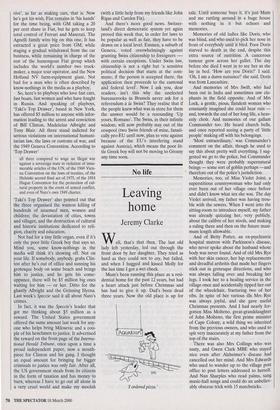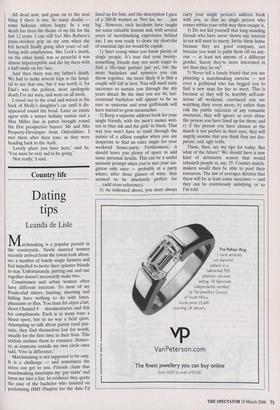No life
Leaving home
Jeremy Clarke
Well, that's that then. The last old lady left yesterday, led out through the front door by her daughter. They tried as hard as they could not to cry, but failed, and when I hugged and kissed Molly for the last time I got a wet cheek.
Mum's been running this place as a resi- dential home for the past 12 years, but had a heart attack just before Christmas and has had to give it up. Dad's been dead three years. Now the old place is up for `I ordered pizza.' sale. Until someone buys it, it's just Mum and me rattling around in a huge house with nothing in it but echoes and memories.
Memories of old ladies like Doris, who was blind, and who used to pick her nose in front of everybody until it bled. Poor Doris starved to death in the end, despite this extra source of nutrition. A cancerous tumour grew across her gullet. The day before she died I went in to see her as she lay in bed. 'How are you Doris?' I said. `Oh, I am a damn nuisance!' she said. Doris was from Lancashire.
And memories of Mrs Swift, who had been out in India and sometimes saw ele- phants in the field opposite. And of Mrs Lock, a gentle, pious, flatulent woman who constantly imagined she could hear rain and, towards the end of her long life, a heav- enly choir. And memories of our gallant Commander too. He heard church bells, and once reported seeing a party of 'little people' making off with his belongings.
`Most extraordinary,' was Commander's comment on the affair, though he used to say this about pretty well everything. I sug- gested we go to the police, but Commander thought they were probably supernatural beings — some sort of goblin perhaps —and ' therefore out of the police's jurisdiction.
Memories, too, of Miss Violet Joint, a superstitious countrywoman who had only ever been out of her village once before and didn't know what sex she was. The day Violet arrived, my father was having trou- ble with the sewers. When I went into the sitting-room to introduce myself, my father was already quizzing her, very publicly, about the calibre of her stools, and making a ruling there and then on the future maxi- mum length allowable.
And of Betty Potter, an ex-psychiatric hospital matron with Parkinson's disease, who never spoke about the husband whose body was never found. And of old Mrs Rye with her skin cancer, her hip replacements and dreadful arthritis that made her fingers stick out in grotesque directions, and who was always falling over and breaking her legs. I took her to a healing service in the village once and accidentally tipped her out of the wheelchair, fracturing two of her ribs. In spite of her various ills Mrs Rye was always joyful, and she gave useful Christmas presents. And I had nearly for- gotten Miss Molteno, great-granddaughter of John Molteno, the first prime minister of Cape Colony, a wild thing we inherited from the previous owners, and who used to spit very inaccurately at my father from the top of the stairs.
There was also Mrs Collings who was nasty, and Gwen Clark MBE who stayed nice even after Alzheimer's disease had cancelled out her mind. And Mrs Edwards who used to wander up to the village post office to post letters addressed to herself. And Nan Sharpies who read palms, sang music-hall songs and could do an unbeliev- ably obscene trick with 15 matchsticks. All dead now, and gone on to the next thing if there is one, So many deaths some hideous; others happy. In a way death has been the theme of my life for the last 12 years. I can still feel Mrs Robson's panic-stricken grip on my arm when she felt herself finally going after years of suf- fering with emphysema. Mrs Lock's death, on the other hand, was so peaceful it was almost imperceptible and she lay there with a half-smile on her face.
And then there was my father's death. We had to make several trips to the hospi- tal to see that one, but it was worth it, for Dad's was the politest, most apologetic death I've yet seen, and went on all week. I stood out m the road and waved at the back of Molly's daughter's car until it dis- appeared round the bend. Later an estate agent with a winter holiday suntan and a Max Miller line in patter brought round the first prospective buyers: Mr and Mrs Property-Developer from Oxfordshire. 1 met them after their tour, as they were heading back to the Audi. `Lovely place you have here,' said he. `You must be very sad to be going.'
`Not really,' I said.



















































































 Previous page
Previous page